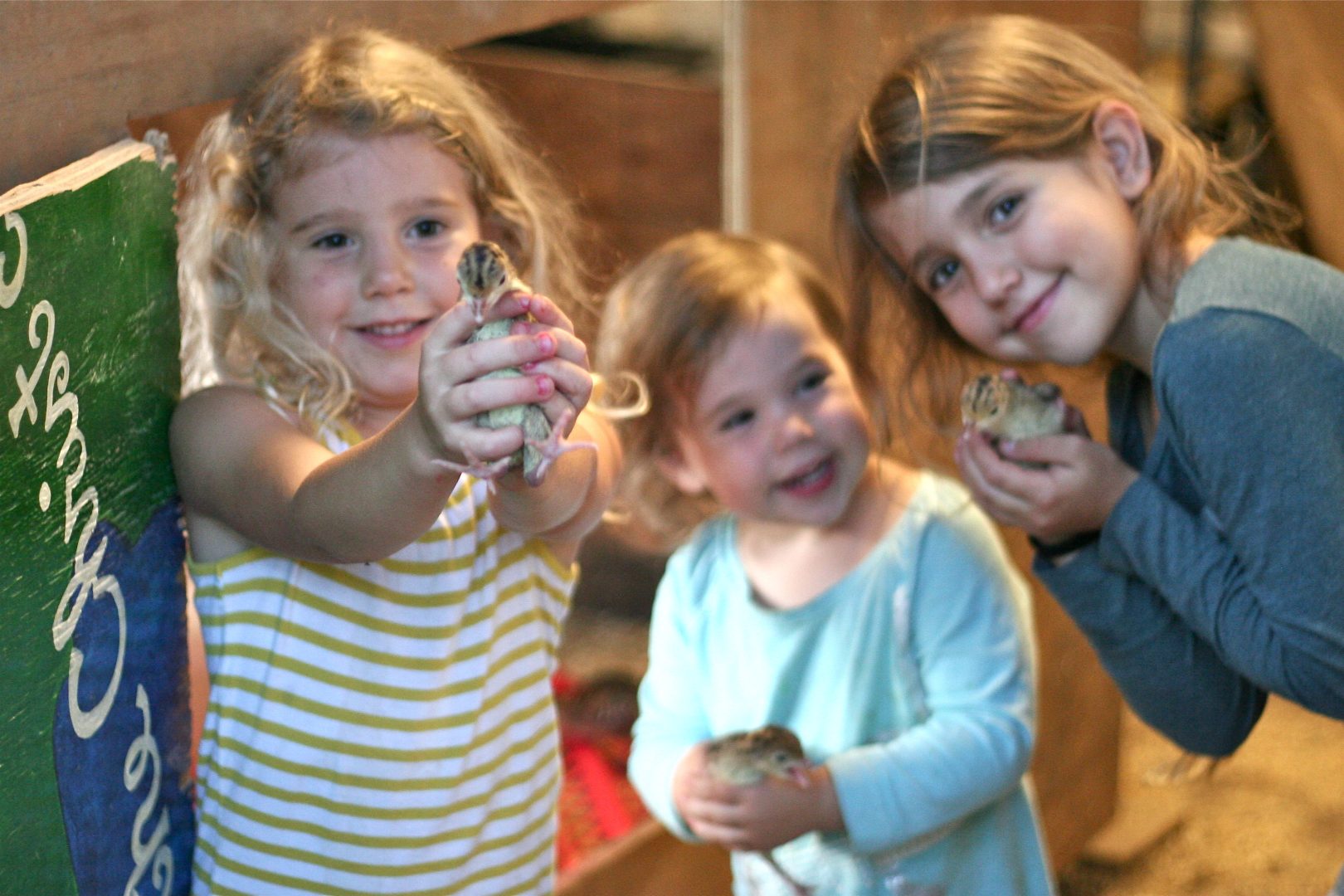How a family in pursuit of healthy food grew into a burgeoning farm business feeding their community in the Upstate
by Leah Joyner, CFSA’s Education Coordinator
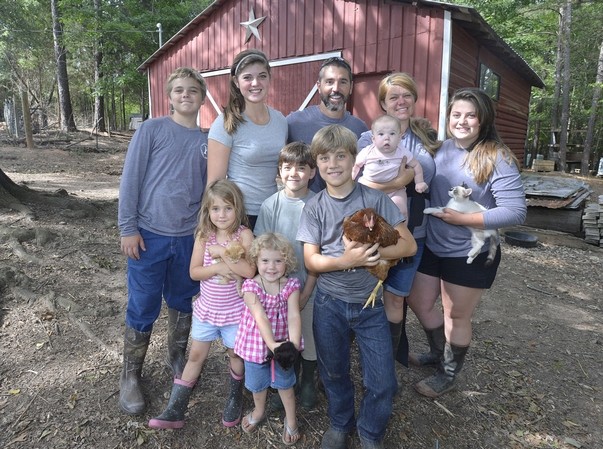
The Kornerstone Farm Family
Photo submitted by Chris Kaiser
Kornerstone Farms is founded on family. Jason and Chris Kaiser, along with their nine children, work together on just a few acres to raise pigs, chickens, dairy goats, grass-fed cattle, quail, honey bees, and heirloom vegetables. What began as a mission to eat better as a family turned into an adventure in farming, food, and community.
Jason and Chris relocated the family from their home in South Florida to South Carolina in 2011. A few years before making the big move they started to value eating better as a family. They found it was hard to find products that were GMO-free and organic, and the raw milk and cheeses they were looking for, so they joined a co-op with other families in their area who were looking for similar products. At the time, the Kaisers were living in a townhome with not much of a yard. Gardening and farming opportunities were extremely limited, but Jason and Chris knew that they wanted to dig deeper.
So they started reading everything they could find about starting a farm. Jason recalls that Joel Salatin’s books had a big impact on their decision to get into farming because of his message to just start small and grow into the farm naturally. So, armed with some crucial knowledge from their research and a healthy appetite for homegrown food, they moved the whole family to the Upstate of South Carolina and started renting an acre of farmland.
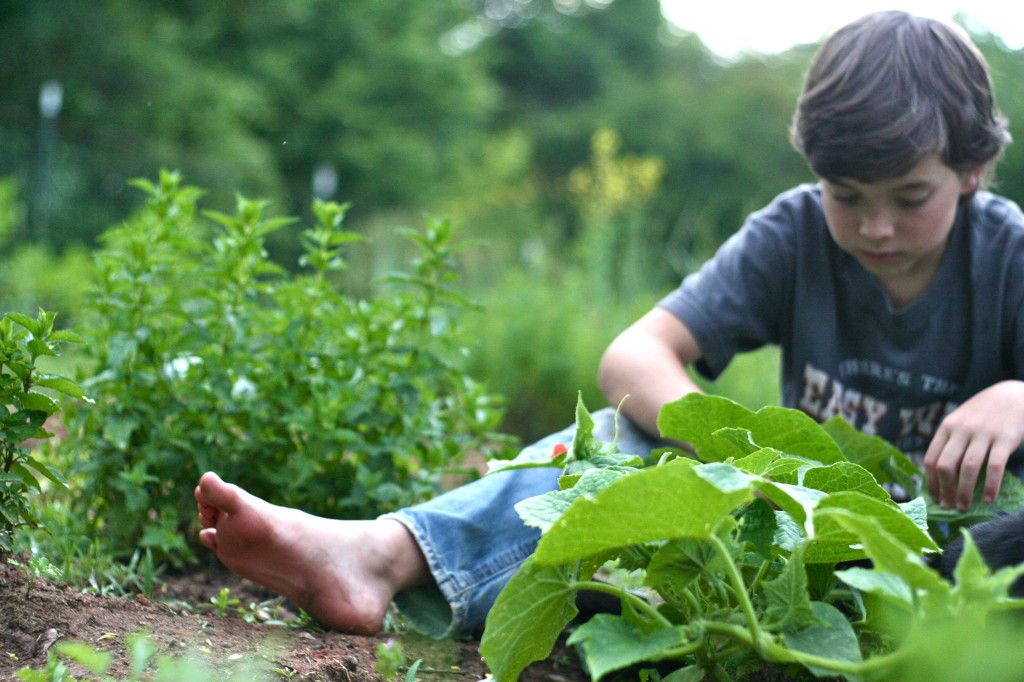
The Kaiser kids all help out around the farm. Here’s Christian weeding cucumbers. Photo submitted by Chris Kaiser
That’s right – this growing family farm started with just ONE acre. They decided to get started by providing their family with eggs, so they tracked down some used chicken on their local Craigslist. After a while, and some success (and some very tasty eggs), the next step was to try growing meat birds for their own consumption. With meat and egg providing regular protein sources, the next step was milk goats. With all of this expansion, the Kaisers decided it was time to buy their own place in Woodruff. They settled on 6 acre parcel of land with a little wiggle room to grow by borrowing additional acreage from neighbors. With more land available, the farm took off. These days Kornerstone Farms is now home to about 150 laying hens, 400 meat birds, and 100 turkeys, plus various numbers pigs, beef cattle, dairy goats, and honey bees. According the Chris, one of the major takeaways from Kornerstone Farms is the story of starting small and scaling up smartly. “The point is – you don’t need 20 acres to start a farm. Start where you are, backyard chickens and eggs. Work with what you have. This is all happened over a period of time, and we are very much still a small farm.”
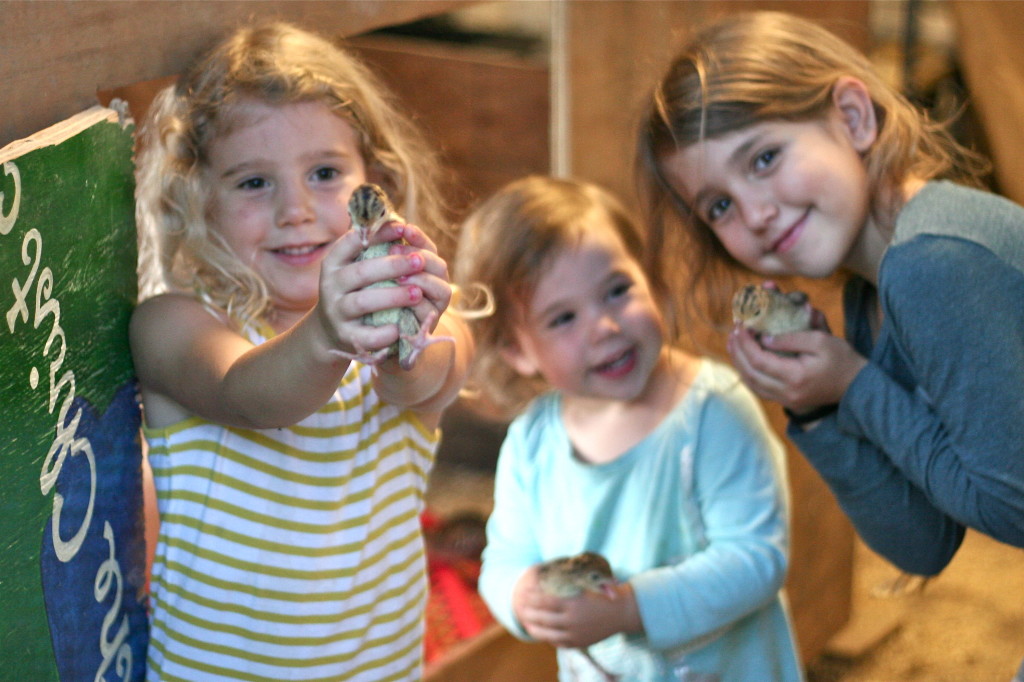
Graycie, Ellie & Maddison prep the baby heritage turkeys for their new homes in the brooder that day. Their daily job is to check the feed and water for these birds.
To keep Kornerstone farm growing, the Kaiser kids (the oldest is 19 and the youngest is 1) are a huge part of the farm. From weeding cucumbers, to milking goats and feeding chickens they all have their own jobs. In addition to caring for the birds when they are young, the kids also monitor food and water supplies, and help out with the processing. Most of the kids are homeschooled at the farm where coursework is focused on responsibility and producing food. Chris and Jason’s vision is to establish a successful, sustainable, multi-generational farm. Their values are strongly rooted in faith, family, community, and stewardship. The Kaisers strive to be “good stewards of what God has given us.” They can already see their goals growing to fruition: several of their children have expressed interest in wanting to continue to farm, grow food, and lead self-sustaining lifestyles.
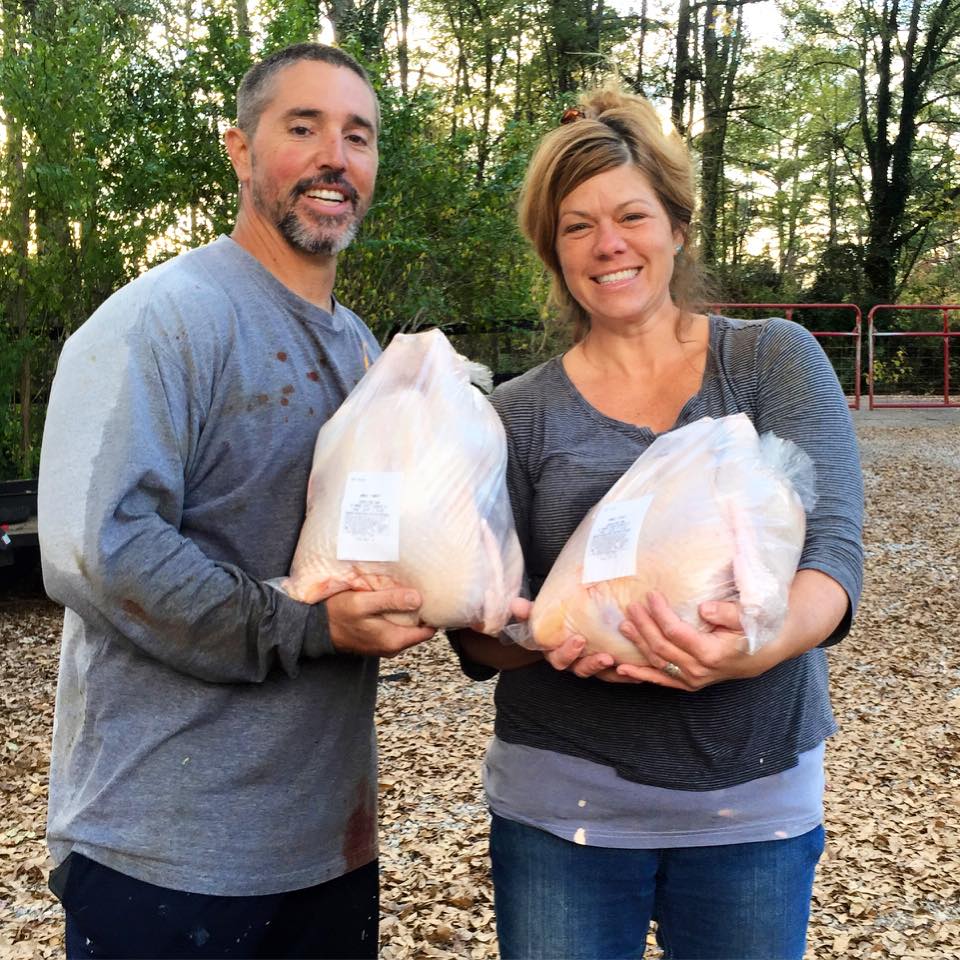
Chris and Jason with their turkeys ready for sale. Every aspect of production happens on the farm.
One of the family’s biggest long term goals is to grow the business to a place that can financially enable Chris to work full-time on the farm. In the meantime, he continues to fulfill his passion for education through his off- farm job as a teacher and coach. The family’s passion for knowledge sharing is also showcased through their annual participation in the Upstate Farm Tour. The 2016 Upstate farm tour will be held June 18th & 19th. During the farm tour visitors can milk a goat, walk through the garden, see that the orchard trees and fruit bushes are starting to produce fruit, watch the pigs root, and learn about how the laying hens are rotated through the property in their egg mobiles. Take a hayride to see the meat birds in their different growing stages at various parts of the farm. At Kornerstone Farms every stage of development from the brooder to the processing happens on the farm. Chris says “It’s important for people to learn about the difference between meat birds and laying hens.” Farm tour visitors will enjoy meeting the Kaiser kids during the farm tour while they host the guided tours.
Chris recalls participating in the Upstate Farm tour as a visitor when the family first relocated to SC. “One of the first things that we did we moved here was to visit as many farms as we possibly could. The farm tour provided us with a way to connect with as many farms as possible in two days. The great thing is that you can connect with those farmers on the tour and then they can help to introduce to other farmers they know.” Chris still remembers the influential tour that Steve Ellis at Bethel Trails Farm gave years ago on the Upstate Farm tour. Chris says, “Seeing how [Steve] did things and how open and honest and available for everyone he was just blew me away. Steve said ‘anytime you want to come here, come see me.’ And it wasn’t just him – the other farmers said, ‘hey anytime you have questions just let us know. Come out.’ And we feel the same way about Kornerstone Farms. We want people to ask us questions and we want to share our knowledge.”
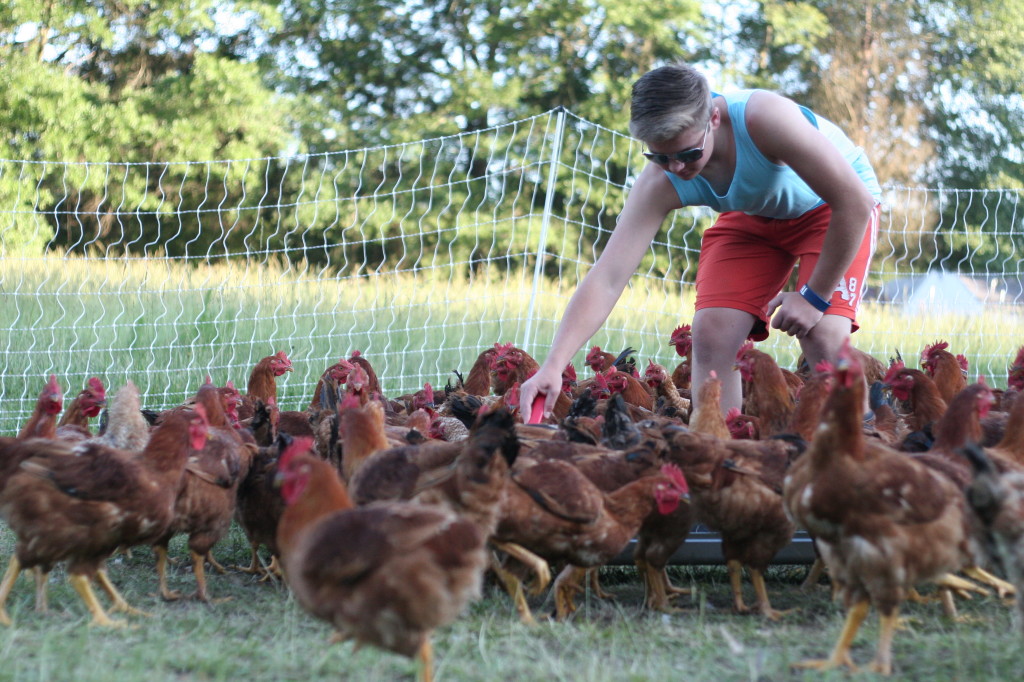
Nathan tending to the freedom ranger meat birds. Photo by Chris Kaiser.
For Chris, one of the most important aspects of opening the farm gates during the Upstate Farm Tour is to help educate consumers about why prices for locally grown, GMO-free, and organic foods can be a bit higher than what you might find in your typical grocers aisles. He believes that “The farm tours allow people to dig in, and learn that the farmer is charging what is necessary in order to make a profit.” Things like GMO-free feed can be costly but feeding their animals the way that they feed themselves is important to the Kaisers.
Through opening their farm gates and welcoming visitors, the Kaiser Family hopes to inspire others to consider becoming stewards of the land by growing their own food. “The reality is that there are not enough farmers. Even though we are so new to do this I would share anything with everybody. The goal is really just for more and more people to produce their own food…That’s why I love to see people cultivating even just a quarter of an acre. Everyone is capable of doing something. Everyone can take a part of some aspect of the food movement.”
Find Kornerstone Farm products at the Taylors farmers market, The Grain Loft, and Swamp Rabbit Cafe and at their blog and Facebook page. And, don’t forget to bring a cooler on the Upstate Farm Tour so you can stock up on goodies during your visit!


